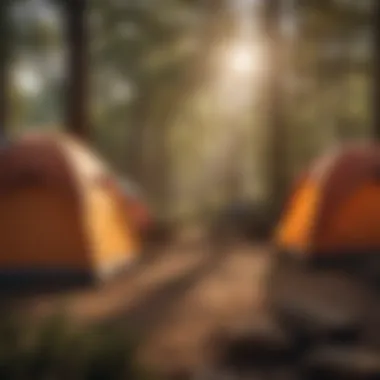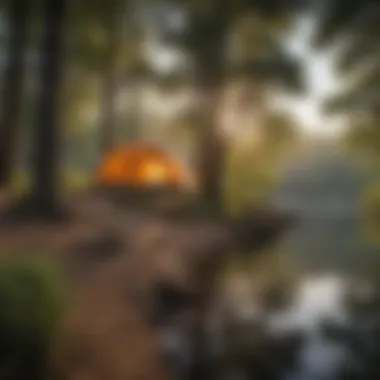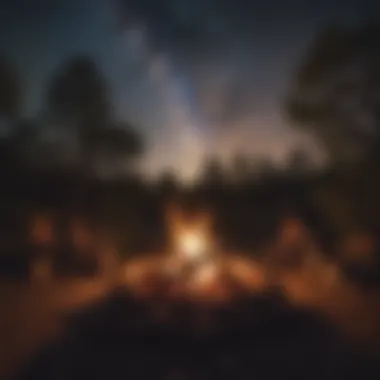Discovering Budget-Friendly Camping Spots in Texas's Diverse Landscapes


Evergreen Trees Species
Texas boasts a diverse array of evergreen trees that add to the natural beauty of its landscapes. From iconic pine species like loblolly pine and longleaf pine to cedar and cypress varieties, each tree plays a vital role in the ecosystem.
Types of Evergreen Trees
Evergreen trees in Texas include the majestic Texas cedar and the adaptable Ashe juniper. Understanding the characteristics of each species can enhance your appreciation for the unique biodiversity found in Texas forests.
Ecological Significance
The ecological significance of evergreen trees lies in their year-round foliage, providing shelter and food for diverse wildlife species. Their ability to thrive in varying climates contributes to the overall ecosystem resilience.
Conservation Practices
Conservation efforts for evergreen trees focus on sustainable logging practices to ensure their longevity. Methods such as selective logging and reforestation projects play a crucial role in preserving these valuable tree species.
Introduction
Understanding Free Camping
Definition of Free Camping
Free camping, also known as dispersed camping, refers to camping outside of designated campgrounds, often on public lands where camping is permitted. This unique form of camping allows individuals to connect more directly with nature, away from the amenities of traditional campsites. One key characteristic of free camping is the freedom it provides in choosing a campsite, fostering a sense of independence and adventure. While free camping offers unmatched serenity and natural beauty, individuals must also consider the lack of facilities and potential isolation as both advantages and disadvantages of this camping style.
Benefits of Free Camping
The benefits of free camping are vast, with cost-effectiveness being a primary advantage. By eliminating campground fees, free camping allows outdoor enthusiasts to allocate their budget towards other aspects of their adventure. Moreover, free camping often offers more privacy and solitude, making it an appealing choice for those seeking a peaceful retreat. The unique feature of self-reliance that free camping promotes can enhance one's outdoor skills and foster a deeper connection with the environment. However, the potential challenges of lack of amenities and limited safety measures should also be taken into account.
Legal Considerations


Bureau of Land Management (BLM) Lands
Bureau of Land Management (BLM) lands play a crucial role in providing opportunities for free camping in Texas. These vast expanses of public land offer diverse landscapes for campers to explore, from rugged deserts to scenic forests. A key characteristic of BLM lands is their accessibility for dispersed camping, allowing visitors to camp off-grid in unspoiled natural settings. The unique feature of BLM lands is the multitude of recreational activities they support, including hiking, fishing, and wildlife viewing. While BLM lands offer unmatched freedom for campers, individuals must adhere to guidelines to protect these fragile ecosystems.
State Forests and Parks Regulations
State forests and parks in Texas maintain specific regulations regarding camping, ensuring the preservation of these natural areas. These regulations dictate where camping is permitted, as well as any restrictions on campfires and wildlife interactions. A key characteristic of state forest and park regulations is their emphasis on conservation and sustainability, encouraging campers to minimize their impact on the environment. The unique feature of regulated camping areas is the provision of amenities such as designated campsites and restroom facilities, enhancing the camping experience. However, individuals must familiarize themselves with these regulations to avoid fines or ecological harm.
Best Regions for Free Camping in Texas
Hill Country
Top Free Camping Sites
When it comes to the Hill Country region, the top free camping sites capture the essence of Texas wilderness at its best. These sites are renowned for their scenic beauty, secluded settings, and proximity to natural attractions. They provide campers with a peaceful retreat amidst lush landscapes, making them a popular choice for those seeking a tranquil camping experience. The unique feature of these sites lies in their accessibility to hiking trails and water bodies, allowing visitors to immerse themselves in nature fully. While these sites offer a serene ambiance, campers should be mindful of the potential lack of amenities and prepare accordingly for a rustic camping experience.
Activities and Attractions
Apart from the camping sites, the Hill Country region boasts a myriad of activities and attractions that enhance the overall camping experience. From hiking and birdwatching to stargazing and fishing, visitors can engage in a variety of outdoor pursuits. The region's diverse ecosystem supports abundant wildlife, offering nature enthusiasts ample opportunities for wildlife sightings. The unique feature of these activities and attractions is their ability to cater to different interests and age groups, making Hill Country a versatile destination for outdoor adventures. While exploring these activities, campers should adhere to Leave No Trace principles to preserve the region's natural beauty and wildlife habitats.
Piney Woods
Hidden Gems for Free Camping
Within the Piney Woods region, hidden gems for free camping provide campers with a secluded and serene environment surrounded by towering pine trees. These gems are characterized by their tranquil settings, making them an ideal choice for those seeking solitude in nature. The key characteristic of these hidden gems lies in their off-the-beaten-path locations, offering a sense of exclusivity to campers. However, campers should exercise caution as the remote nature of these sites may limit access to amenities and emergency services.
Wildlife Encounters
In addition to hidden gems, Piney Woods is known for its diverse wildlife encounters, making it a captivating region for animal enthusiasts. From deer and squirrels to a variety of bird species, campers can witness wildlife in its natural habitat. The key characteristic of these encounters is the opportunity to observe and learn about different species up close, providing a memorable camping experience. However, campers should practice wildlife awareness to ensure their safety and the preservation of the region's biodiversity.
Gulf Coast


Beachside Camping Options
Along the Gulf Coast, beachside camping options offer a unique coastal experience for campers looking to unwind by the sea. These options provide direct access to sandy shores and panoramic views of the Gulf of Mexico, creating a picturesque setting for camping. The key characteristic of beachside camping lies in the soothing sound of ocean waves and the opportunity to engage in water activities such as swimming and beachcombing. While camping by the coast offers a tranquil escape, campers should be aware of tide schedules and potential weather changes to ensure a safe and enjoyable experience.
Regulations to Note
When exploring the Gulf Coast region, campers must be aware of specific regulations that govern camping along the coastline. These regulations outline restrictions on beach driving, campfire protocols, and waste disposal to protect the fragile coastal ecosystem. The key characteristic of these regulations is their emphasis on environmental conservation and visitor safety, ensuring a sustainable camping experience for all. While adhering to these regulations may require additional planning, campers contribute to the preservation of the Gulf Coast's natural resources and habitats.
West Texas
Desert Camping Experiences
In the vast expanse of West Texas, desert camping experiences offer unique opportunities to connect with the rugged beauty of the desert landscape. These experiences immerse campers in arid environments characterized by stunning rock formations and sprawling desert vistas. The key characteristic of desert camping lies in the chance to witness breathtaking sunsets and sunrises against a backdrop of mesas and canyons, creating a magical camping ambiance. However, campers should be prepared for extreme temperature fluctuations and limited water sources in the desert environment.
Stargazing Opportunities
One of the highlights of camping in West Texas is the unparalleled stargazing opportunities afforded by the region's clear night skies. These opportunities allow campers to marvel at the Milky Way and countless stars, offering a mesmerizing celestial experience. The key characteristic of stargazing in West Texas is the visibility of constellations and celestial phenomena, making it a preferred choice for astronomy enthusiasts. While enjoying the night sky, campers should minimize light pollution and use red filters on flashlights to preserve the dark sky for optimal stargazing.
Preparation and Safety Tips
Essential Gear Checklist
Tent and Sleeping Gear
When it comes to essential gear for camping in Texas, the tent and sleeping gear hold pivotal importance in ensuring comfort and protection against the elements. A durable and weather-resistant tent is essential for safeguarding against inclement weather conditions that are commonplace in Texas, including sudden thunderstorms and fluctuating temperatures. Investing in high-quality sleeping gear, such as insulated sleeping bags and comfortable sleeping pads, can significantly enhance the quality of rest amidst the outdoor elements, promoting rejuvenation for the next day's adventures. The key characteristic of top-tier tent and sleeping gear lies in their ability to offer both durability and functionality, enabling campers to withstand various environmental challenges while providing a cozy retreat after a day full of exploration. Despite the initial investment, the reliability and comfort provided by quality tent and sleeping gear make them indispensable assets for a successful camping trip in Texas.
Cooking Supplies
Another critical aspect of camping preparation revolves around gathering the necessary cooking supplies to sustain oneself throughout the outdoor excursion. From portable stoves to lightweight cookware, having a well-equipped kitchen setup can elevate the overall camping experience by allowing campers to prepare hot meals and beverages even in the wilderness. The key characteristic of efficient cooking supplies lies in their portability and durability, enabling campers to easily transport and utilize these items in diverse camping environments. While some may consider cooking in the outdoors a challenging endeavor, the unique feature of cooking supplies is their ability to simplify the meal preparation process, offering convenience and versatility in creating delicious campsite dishes. Despite potential challenges like limited storage space and minimal kitchen amenities, the advantages of using specialized camping cooking supplies outweigh any minor inconveniences, enhancing the overall camping experience through culinary enjoyment and self-sufficiency.


Wildlife Awareness
In addition to gear preparation, understanding and practicing wildlife awareness play a crucial role in ensuring camper safety and environmental conservation during a Texas camping adventure. Being knowledgeable about local fauna, including common snakes and insects indigenous to Texas landscapes, can help campers proactively avoid potential encounters and mitigate risks associated with venomous wildlife. By familiarizing oneself with the distinctive characteristics and behaviors of Texas wildlife, campers can navigate the natural environment with heightened caution and respect, minimizing disruptions to the ecosystem while safeguarding personal well-being.
Snakes and Insects
When delving into the nuances of wildlife awareness, focusing on snakes and insects prevalent in Texas can aid campers in recognizing potential hazards and taking precautionary measures to prevent bites or stings. Understanding the habitats and habits of native snake species and insects can guide campers in identifying danger zones and employing effective prevention strategies to ensure a harmonious coexistence with the local wildlife. While encounters with snakes and insects may evoke unease among campers, the unique feature of proactive wildlife awareness lies in its ability to instill confidence and promote responsible outdoor practices, fostering a deeper appreciation for the interconnectedness of humans and nature.
Bear Safety
Moreover, when camping in certain regions of Texas known for black bear populations, prioritizing bear safety measures becomes imperative to minimize human-wildlife conflicts and preserve the natural habitat. By adhering to recommended guidelines such as proper food storage, waste disposal, and noise control, campers can significantly reduce the likelihood of attracting bears to the campsite and mitigate potential risks of confrontations. The key characteristic of effective bear safety practices lies in their ability to promote mutual respect between humans and wildlife, fostering a safe and harmonious camping environment for both species. While encountering a bear in the wild can be a nerve-wracking experience, understanding and implementing bear safety protocols serve as essential tools in promoting cohabitation and conservation efforts, fostering a sustainable ecosystem for future generations.
Tips for a Memorable Camping Experience
In the realm of outdoor adventures, the significance of crafting a memorable camping journey cannot be overstated. As we navigate the myriad options for free camping in Texas, understanding the essence of ensuring a memorable experience is paramount. This section serves as a beacon, illuminating key strategies and considerations to elevate your camping escapades to unforgettable heights.
For those seeking to embark on a budget-friendly outdoor sojourn in the expansive landscapes of Texas, incorporating tips for a memorable camping experience is indispensable. From Leave No Trace principles to fostering communal etiquette, each aspect contributes to not only enhancing personal enjoyment but also preserving the natural sanctity of the camping grounds. Prioritizing these tips fosters a holistic camping ethos, inviting campers to partake in ethical and sustainable outdoor practices. By integrating these insights into your camping routine, you not only elevate your own experience but also contribute to the preservation of Texas' diverse ecosystems.
Leave No Trace Principles
Pack It In, Pack It Out
Diving into the fundamental tenets of Leave No Trace principles, the concept of 'Pack It In, Pack It Out' emerges as a pivotal directive in responsible camping stewardship. This principle underscores the importance of carrying out all waste and belongings from the campsite, leaving no trace of human presence behind. By adhering to this practice, campers play a critical role in conserving the pristine beauty of Texas' natural landscapes while mitigating environmental impact. The essence of 'Pack It In, Pack It Out' lies in fostering a sense of accountability and environmental mindfulness, ensuring that future generations can also revel in the untainted allure of free camping in Texas.
Respect Wildlife
Delving into the realm of wildlife interactions, the principle of 'Respect Wildlife' emerges as a cornerstone of ethical camping conduct. By honoring the natural rhythms and boundaries of Texas' indigenous fauna, campers cultivate a harmonious coexistence with the local ecosystem. Understanding the significance of maintaining a respectful distance, refraining from feeding wildlife, and minimizing disruptions to their habitats is essential in upholding the ethos of responsible camping. By embracing the philosophy of 'Respect Wildlife,' campers not only prioritize animal welfare but also engender a deeper appreciation for the interconnectedness of all living beings within the realm of nature.
Community Etiquette
Noise Levels
Within the tapestry of communal camping dynamics, the consideration of noise levels emerges as a linchpin in fostering a harmonious cohabitation within camping grounds. Balancing the enjoyment of one's outdoor experience with the respect for fellow campers necessitates a conscientious approach towards managing noise levels. By maintaining a tranquil ambiance and adhering to designated quiet hours, campers seed a culture of mutual respect and consideration, enhancing the overall harmony of the camping community.
Campfire Guidelines
Embarking on nocturnal reveries under the celestial canopy, the ritual of gathering around campfires beckons a poignant tradition deeply intertwined with the camping narrative. Adhering to campfire guidelines safeguards both the safety of campers and the preservation of the natural surroundings. By abiding by established protocols, such as fire ring usage, safe extinguishment practices, and mindful fuel selection, campers weave a tapestry of responsibility and camaraderie around the communal hearth. Upholding campfire etiquette not only ensures a secure and enjoyable camping experience but also reinforces a collective commitment to nurturing and safeguarding Texas' natural heritage.



